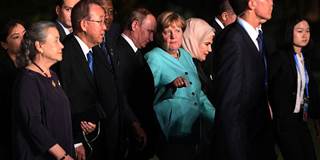In today’s global culture, where simple models help make sense of so much complexity, German Chancellor Angela Merkel and Russian President Vladimir Putin embody opposing archetypes of national leadership. Such icons emerge during periods of political and economic strain, with other national leaders aligning with one or the other.
PRINCETON – In today’s global culture, where simple models help make sense of so much complexity, German Chancellor Angela Merkel and Russian President Vladimir Putin embody opposing archetypes of national leadership. Like others before them, such icons often have a foil – a yang for a yin – that establishes a stark choice between two alternate worldviews.
That was certainly true in previous periods of political and economic strain. For example, in the aftermath of World War I, with democratic political systems disintegrating, much of the world looked to either Benito Mussolini in Italy or Vladimir Lenin in Russia to determine the future.
In the 1920s, Mussolini convinced many foreign observers that he had devised the optimal way to organize society, one that overcame the anarchy and self-destructiveness inherent in traditional liberalism. Under Mussolini, Italy was still integrated into the world economy, and official corporatism, with its emphasis on the supposed harmony of interests between capital and labor, seemed to many to herald a future without class conflict and pitched political struggle.

PRINCETON – In today’s global culture, where simple models help make sense of so much complexity, German Chancellor Angela Merkel and Russian President Vladimir Putin embody opposing archetypes of national leadership. Like others before them, such icons often have a foil – a yang for a yin – that establishes a stark choice between two alternate worldviews.
That was certainly true in previous periods of political and economic strain. For example, in the aftermath of World War I, with democratic political systems disintegrating, much of the world looked to either Benito Mussolini in Italy or Vladimir Lenin in Russia to determine the future.
In the 1920s, Mussolini convinced many foreign observers that he had devised the optimal way to organize society, one that overcame the anarchy and self-destructiveness inherent in traditional liberalism. Under Mussolini, Italy was still integrated into the world economy, and official corporatism, with its emphasis on the supposed harmony of interests between capital and labor, seemed to many to herald a future without class conflict and pitched political struggle.